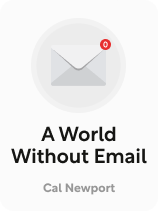

This article is an excerpt from the Shortform book guide to "A World Without Email" by Cal Newport. Shortform has the world's best summaries and analyses of books you should be reading.
Like this article? Sign up for a free trial here.
Are you distracted by emails at every moment? What are some email management strategies that can help you stay focused?
Cal Newport’s book A World Without Email suggests emails are a major distraction at work. If you don’t have a proper email management system in place, you’re likely to develop what Newport calls a hyperactive hive mind workflow (HHMW).
Here are three email management strategies for HHMW, all of which are predicted on his principle of attention capital.
Strategy #1: The Process Principle
The first email management strategy is the process principle. It’s the idea that companies should institute processes—systems and workflows—that enhance the performance of knowledge workers and make their work more enjoyable.
(Shortform note: Newport’s choice of the word “process” may seem arbitrary because “process” is a loose term that doesn’t in itself communicate much about this idea. However, a formal definition of a “work process” is a system that generates value for a company. This additional context clarifies the principle somewhat—perhaps an alternative, more specific name for it could be the “value-generation principle.”)
Newport feels that many companies fear instituting structured processes for their knowledge workers because these reduce the autonomy and flexibility considered integral to effective knowledge work. In reality, while structures may marginally reduce autonomy and flexibility, they more importantly keep the workplace equitable and efficient: Without formal processes, humans tend to try to do as little work as possible, and influential employees pawn work off on hard-working colleagues.
(Shortform note: The freelancer might be more familiar than anyone with the need to balance autonomy and flexibility with discipline and processes to be optimally productive. Freelancers understand that while autonomy is nice, if you don’t institute certain processes and rules for yourself, you’ll never get anything done. More likely, you’ll abuse your “future self” by procrastinating or forcing yourself to work on weekends to meet deadlines.)
Newport recommends two processes in particular: task board-based and automated.
Strategy #2: The Protocol Principle
Beyond setting up workflows that efficiently extract value from knowledge work, Newport recommends that companies set up rules for how people communicate to reduce inefficient cognitive switching and unnecessary work. This is the email management strategy known as the protocol principle. Rules can be challenging to implement in the short term but can result in greater productivity in the long term.
(Shortform note: Like “the process principle,” the “protocol principle” is a slightly vague term, as we use the word protocol loosely across many contexts. We might consider “communication conventions” as a substitute for “protocol,” as this perhaps more pointedly conveys the idea that a workplace must institute standards for communication. )
Newport recommends setting up protocols for several aspects of your work such as:
- Scheduling meetings
- Answering questions
- Clients
- Emails
- Status meetings
Below we’ll look at protocols for clients and emails that are most important to implement for better communication that won’t disrupt productivity.
Protocols for Clients
In setting up protocols for clients, make it easy for them to follow progress on a project without having to send many emails—a portal or project page can facilitate this, writes Newport. Be clear in the contract with clients about how you’ll communicate with them. Finally, when necessary, implement crisis protocols—ways for the client to reach you in an emergency.
(Shortform note: The prospect of setting the terms of your interactions with clients might seem uncomfortable: Most of us operate under the assumption that the business should adapt to the client’s needs. But others feel that not only should you set the terms of your client interactions, but you should also fire clients who are bad for your business because they take up too much time or don’t listen to your advice.)
Protocols for Email
Consider strictly limiting email length, advises Newport. This ensures that only the simple communication suited to the email format is handled that way and that any other communication happens in person.
When it comes to communication with entities outside the company, like clients and vendors, you might ask these entities to email a general inbox rather than individual employees. This decreases the expectation on the part of clients and vendors that your employees will check their accounts frequently and feel a personal obligation to respond. For clients, you might even set up an email account with their name—clientname@yourcompany.com—and ask them to send queries to this address.
Strategy #3: The Specialization Principle
Newport’s last email management strategy for optimizing the systems that extract value from knowledge work is to have workers focus on fewer tasks and do them with higher quality and accountability—in other words, to specialize. This means you don’t lose productivity by multitasking, and you don’t waste time answering unimportant questions.
(Shortform note: Other time management specialists agree with Newport that to produce the highest-quality work, you must specialize. In Eat That Frog, Brian Tracy even specifies that three tasks at work let you add the most value, so you should figure out what those three tasks are, and move all other responsibilities off your plate.)
Here’s one way Newport advocates for companies to let knowledge workers specialize:
Pass Off Ancillary Work Someone Else Can Do Better
Let workers hand off ancillary tasks—secondary tasks that support the primary operations of a company or worker—to someone who can do them more efficiently than you. For a business owner, these are things like marketing, customer service, travel booking, and so on, and for a knowledge worker, these are things like scheduling meetings, answering minor queries, and handling speaker requests. This may mean losing some revenue at first, but in the end, it will be more productive than knowledge workers doing everything themselves.
(Shortform note: But what if you can’t delegate work? First, approach the person who assigned the ancillary work in the first place and ask them how to prioritize this task among your existing tasks. This may prompt them to reassign it. If they don’t, still try to find parts of the task you can pass off, even if they’re small. Taking these steps might not even incur a loss of revenue—though they don’t necessarily solve the long-term problem of having too much on your plate.)

———End of Preview———
Like what you just read? Read the rest of the world's best book summary and analysis of Cal Newport's "A World Without Email" at Shortform.
Here's what you'll find in our full A World Without Email summary:
- How email makes knowledge workers less productive and more unhappy
- How to improve the channels through which people communicate
- Why you should implement protocols to reduce unnecessary work






